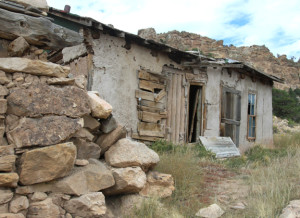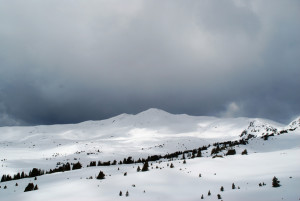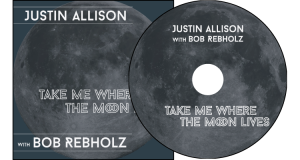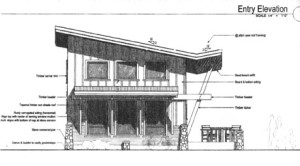by George Sibley
As birds have flight, our special gift is reason. … Should we choose, we could exercise our reason to what no other animal can do: we could limit ourselves voluntarily, choose to remain God’s creatures instead of making ourselves gods. – Bill McKibben, The End of Nature
Reason is just not as powerful as some like to give it credit for. The truth is closer to the way Scottish Enlightenment philosopher David Hume put it: ‘Reason is, and ought only to be the slave of the passions, and can never pretend to any other office than to serve and obey them.’ – David Ropeik, www.bigthink.com
Are humans rational beings? And if we are, what does that mean – especially when confronted by problems we’ve brought on ourselves? Does it mean we will apply reason (as McKibben hopes) to correct our mistakes and develop more intelligent behaviors? Or does it mean we will just use whatever reasoning power we have to figure out (as Hume suggests) how to excuse ourselves and continue to carry out the will of our heart, stomach or lower organs?
Questions like that become important in times like this. Last month in this space, I did some tentative exploration of what it means to live in an epoch now being described by many scientists as “the Anthropocene,” an epoch in which fundamental planetary systems – most notably, the global climate – are being changed by human actions on a geological scale, in ways unfriendly to most current species of life, and possibly irreversible until “Atlas shrugs” again in some new paroxysm of geological rearrangement.
Never mind that we didn’t mean to do this, didn’t do it consciously. The question now is: can we finally begin to assert our “special gift” of reason in ways that will significantly slow or stop the systemic changes we’ve initiated? Or are we going to continue using that gift to rationalize that a) this isn’t really happening, or b) if it is, God won’t let it be bad for his favorite species, or c) we can’t do anything because taking the necessary steps would plunge the world into economic depression, or d) the whole situation is simply beyond our power to change so we will just have to ride it out and hope for the best, and e) if it’s truly the last days of Western Civilization – let’s party!
I’ve just finished reading two books that, taken together, provide an ominous perspective on this topic of human rationality and whether it might save us. The “serious book” of this pair is A Great Aridness: Climate Change and the Future of the American Southwest by William deBuys. The “bedtime book” – always a novel – is a thoroughly dystopian futuristic story set in the American Southwest: The Water Knife by Paolo Bacigalupi. It is as if Bacigalupi read deBuys’ book and said, “Okay folks, here’s what that will look like, down on the ground, if we don’t listen to him and McKibben.” It is a serious novel.
Space available does not permit a proper review of either book, let alone both together, but both are, in a way, reflections on the question of rationality and us, and deBuys sees the setting in the American Southwest as important: “Endowed as it is with abundant financial, human and technological resources … nowhere else will the drama [of confronting climate change] be acted out more elaborately or reported more thoroughly.”
One thing we all think we know about our species is that we rally around each other in a disaster, and actually do figure things out together. But a single paragraph in deBuys’ book challenges that in the case of the “disaster” peculiar to arid lands:
“Sudden catastrophes, like earthquakes, fires, and great storms, bring people together. [People] pitch in, cooperate, and ignore the economic and social divisions that previously held them apart…. But drought is different. It is gradual and drawn out. You don’t know you are in it until it is already well begun, and you never know when it will end. An earthquake shudders and is over; a fire blazes and dies; a storm finally passes. But a drought creeps on. It is not a thing; it is the absence of things – rain and snow – that might cancel it. Drought doesn’t dissolve differences in the shock of thunderbolt change; it gives people plenty of time to erect defenses, pick sides, and meditate on the defects of their neighbors. Drought divides people, a fact that should remind us that solving the conundrum of water, growth, and hardened demand is work best done in the present, before the curve of rising need and the downshifting of limits slam together.”
[InContentAdTwo]
Bacigalupi’s story is what happens when that slamming-together is allowed to happen, through the kind of official fiddling we are seeing at best today as our world starts to smolder. He sees the disaster unfolding in the deserts – Chihuahua, Sonora, Mojave – that deBuys visits in his book, deserts otherwise known as Texas, Mexico, New Mexico, Arizona, Nevada and Southern California. Texas falls apart first (no surprise there), sending a massive migration of pissed-off Tea Partiers into the Phoenix-Tucson corridor, already in trouble because someone (probably the “Calies”) blew up the Central Arizona Project aqueduct; central Arizona’s municipal and state order more or less collapses under that onslaught of disaster. The Colorado River between Arizona, Nevada and California becomes an armed border, with Calies and Nevadans, hired from the ranchers and farmers de-watered by the ever-growing cities, fending off desperate “Zoners” and Texans trying to escape the 120-degree hell of Arizona without air-conditioning.
Arizona security forces are meanwhile employed to protect huge “arcologies” – essentially dense, truly “inner” cities with workplaces, hydroponic farms and living spaces integrated inside the ultimate walled communities, built by the Chinese with drug money from Mexico (which has been entirely taken over by the cartels). The arcologies recycle their own water and nutrients (all of it, yes, that too) and cool the air inside with multi-story recycling waterfalls, while the masses outside line up at Red Cross wells to buy water by the liter at ever-fluctuating prices – all wearing dust masks because the dry hot air is dense with viruses and germs seldom rinsed out by rain. You should have no need to ask who is inside and who is outside the arcologies; the escalating American separation of haves and have-nots is completed over access to today’s ongoing illusion of abundant water.
Bacigalupi had inscribed the copy of the book I borrowed with the epigram: “No future is inevitable!” But one begins to wonder – especially as one watches our Congressional Clown Show at work and play – how we can avoid the future he chronicles. Can McKibben’s special gift operate at all in environments of such cultural noise and chaos as Bacigalupi imagines – and the Tea Party creates?
Paul Crutzen, the climate scientist who first introduced the term “Anthropocene,” believed that “the spread of more free and open societies with independent media” and “the growth of democratic political systems” globally could help us to turn our newfound awareness of our impact on the planet toward positive ends for ourselves and the planet, presumably through the exercise of our special gift of reason.
But those who are running the big show called America mostly seem to use reasoning to justify positions and strategies that range from the obviously self-serving (corporations being legal self-serving selves) to the spectacularly absurd (Republican primaries). Our society is now also clearly a “democratic political system” in name only, since polls are being ignored that show a strong majority of Americans actually want the government to start addressing the challenges of the Anthropocene.
But our nongoverning government may just be protecting us from our better instincts there, reminding us to be careful what we wish for. Will that same majority exist when, say, gasoline prices rise to the true cost to the planet of burning fossil fuels – estimated between $10 and $20 a gallon, depending on what environmental costs are included? Or when you reach the third tier in your local water pricing system elevating the cost of water to two bucks per flush with six days to go in the billing period?
When or if we actually begin confronting the challenges we’ve posed for ourselves in the Anthropocene epoch, we will find plenty of situations where we will be tempted to use our special gift to rationalize ourselves back to Know-Nothings, as many already have. At which point, we should hope enough of us can begin to develop (or rediscover) other special gifts, like the seven-generation sense of responsibility to our descendants, and a more conscious and caring love for our still-wonderful and resilient planet, and other qualities of what we call, when we think of it, character.
George Sibley rationalizes in the high desert of the Upper Gunnison River Basin.




